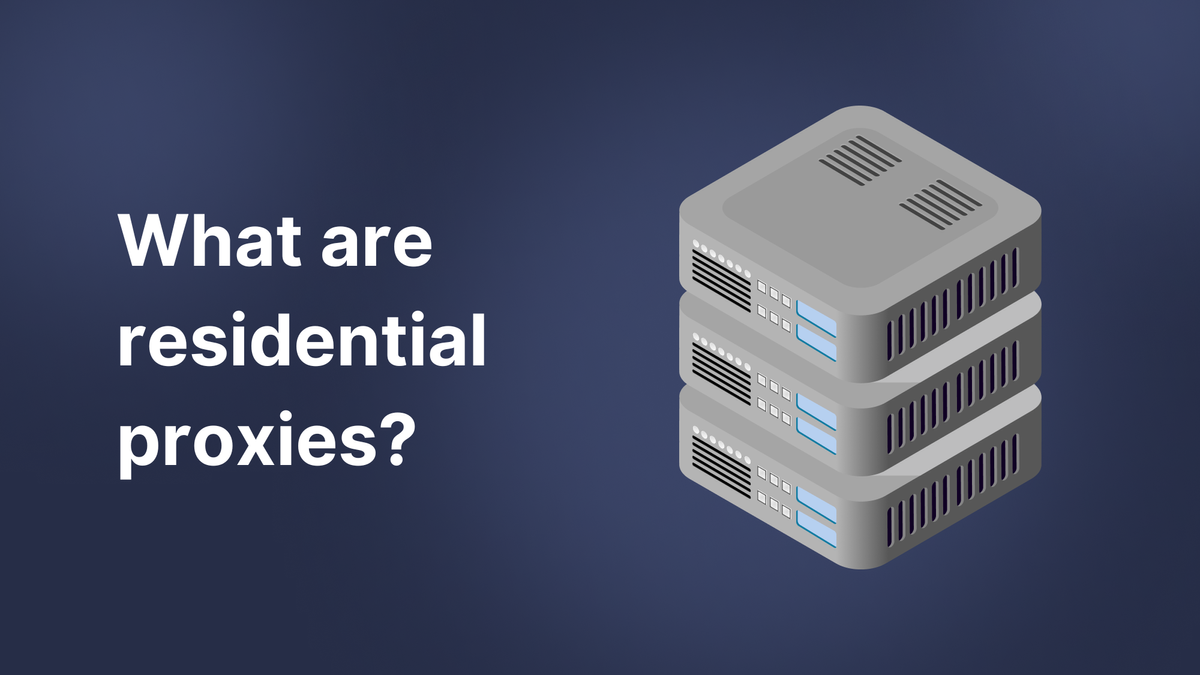How to use residential proxies: full guide
Let's see what residential proxies are, how they're different from regular ones, what types there are, and how to set up a residential address.

Online professionals use residential proxies in various tasks, such as web scraping, social media management, or ad verification. These proxies enable users to access websites without facing blocks or detection.
As residential IP addresses belong to real devices and users, they encounter fewer blocks from websites compared to VPN or data center proxies. This makes them more reliable and legitimate for specific needs. Residential proxies typically come at a higher cost than data center proxies due to the increased expense of acquiring residential IP addresses. However, they offer superior reliability and effectiveness for many tasks.
Let's see what residential proxies are, how they're different from regular ones, what types there are, and how to set up a residential address.
How do residential proxies work?
Residential proxies establish a connection between your device and the internet through intermediary servers. When you want to visit a website, your request goes through these special servers first instead of connecting directly. Proxy servers, known as residential proxies, route your internet traffic and requests through IP addresses associated with residential homes. These servers have IP addresses that look like they belong to regular homes, not data centers.
When you send a request to access a website, it is transmitted to the residential proxy server. The proxy server then forwards the request to the website on your behalf, using one of its residential IP addresses. So, when the website sees your request, it looks like it's coming from a real person's home. The process effectively masks your device's true IP address and location, making it appear as though you're browsing from a different geographical location. This mechanism enables users to bypass geo-restrictions, access region-locked content, and maintain anonymity while browsing the internet. This helps you access websites that might otherwise be blocked based on your location.
The benefits of residential proxies
Datacenter proxies are IP addresses hosted on servers in data centers. They are generally faster and cheaper than residential proxies. However, they lack the authenticity and reliability of residential IPs. Residential proxies have some unique advantages that make them especially useful.
Advantages of residential proxies
Authenticity: Residential proxies use IP addresses assigned by Internet Service Providers (ISPs) to real residential devices. This makes them look like genuine users, which is crucial for some online activities.
Reliability: Since residential proxies are tied to real devices, they are less likely to be detected and blocked by websites. This reliability ensures uninterrupted access to online content.
Anonymity: Residential proxies offer a higher level of anonymity compared to data center proxies. With residential IPs, your online activities are less likely to be traced back to your original location or identity.
Geographical Diversity: Residential proxies provide a wide range of IP addresses from different geographical locations. This diversity allows users to access region-restricted content and bypass geo-blocking measures effectively.
Compliance: For tasks requiring adherence to regulations or terms of service, residential proxies offer a safer option. Their legitimate nature reduces the risk of violating website policies or facing legal repercussions.
Whether it's web scraping, market research, or ad verification, residential proxies provide a competitive edge in maintaining anonymity and accessing online content seamlessly.
Mobile vs residential proxies
Mobile proxies, unlike residential proxies, utilize mobile networks instead of home internet connections. This distinction often results in faster and more reliable performance, especially for time-sensitive tasks such as sneaker copping, social media management, and ticket purchasing.
However, mobile proxies have their drawbacks. They can be more expensive than residential proxies and may have limited geographic coverage, depending on the availability of mobile networks in certain areas.
Residential proxies, on the other hand, are best suited for activities where mimicking the behavior of a regular internet user is essential. Tasks like data scraping, market research, and ad verification benefit from the anonymity and authenticity provided by residential proxies.
Both residential and mobile proxies are essential tools for web scraping and online privacy. Your choice between them should consider your specific needs, budget, and performance requirements.
Rotation or static residential proxies?
When it comes to residential proxies, there are two primary types to consider: rotation and static. Rotation residential proxies operate by frequently changing IP addresses. This constant rotation mirrors typical internet user behavior and aids in evading website blocks or detection. With rotation proxies, your IP address shifts with each request or at regular intervals.
If you require high levels of anonymity and frequent IP changes, rotation proxies are your best bet. They excel in tasks like web scraping, data mining, and sneaker copping, where adaptability and anonymity are paramount. By rotating IP addresses dynamically, they offer flexibility in accessing restricted or geo-locked content.
On the flip side, static residential proxies maintain a fixed IP address for an extended period. Unlike rotation proxies, they do not undergo frequent changes. Static proxies are ideal for scenarios where consistency is key. Whether you're managing social media accounts, accessing subscription-based services, or conducting market research, static proxies provide stability and reliability. With a fixed IP address, they ensure uninterrupted access over the long term.
The decision between rotation and static proxies hinges on your specific project requirements. Rotation proxies offer dynamic IP rotation, catering to tasks that demand frequent changes and anonymity. Conversely, static proxies provide a steady IP address, catering to activities requiring consistent access over time. Consider your project needs, longevity, and desired level of anonymity when making your choice.
Using residential proxies with antidetect browser
Using an anti-detection browser without proxies is a common mistake. The thing is, the browser doesn't automatically change your IP address, so without proxies, it's easy for the anti-fraud system to figure out who you are when you visit a website again. So, you're not anonymous in this case.
Residential proxies are a powerful tool for ensuring anonymity and bypassing geo-restrictions. When used in conjunction with anti-detect browsers, they provide an extra layer of privacy and anonymity.
How to use residential proxies with anti-detect browsers effectively
Choose a reliable residential proxy provider
Start by selecting a reputable residential proxy provider that offers a diverse pool of IP addresses from residential devices. Look for providers that offer rotating IPs and ensure they have a good reputation for reliability and performance.
Obtain residential proxy credentials
After selecting a provider, obtain your residential proxy credentials, including the proxy IP address, port number, username, and password. These credentials will be used to configure your anti-detect browser to route traffic through the residential proxy network.
Configure your anti-detect browser
Next, open your anti-detect browser profile, look for the proxy configuration options, and enter the residential proxy credentials provided by your proxy provider. Be sure to specify the proxy type (HTTP or SOCKS) and any other required parameters.
Test your connection
Once you've configured the proxy settings, test your connection to ensure that the anti-detect browser is successfully routing traffic through the residential proxy network. Visit Whoer.net and verify that the IP address matches your configured residential proxy IP address.
By following these steps, you can effectively use residential proxies with anti-detect browsers to enhance your online privacy and security. Whether you're conducting market research, web scraping, or engaging in other online activities, residential proxies provide the anonymity and geo-unblocking capabilities you need.


